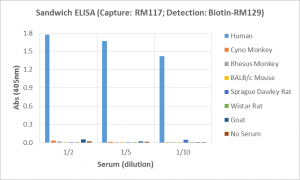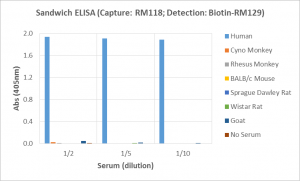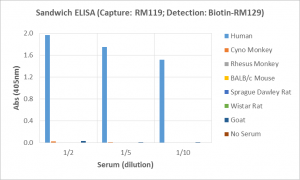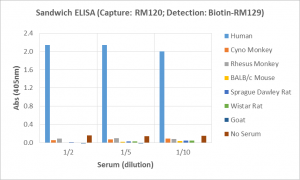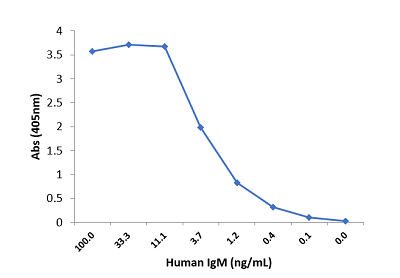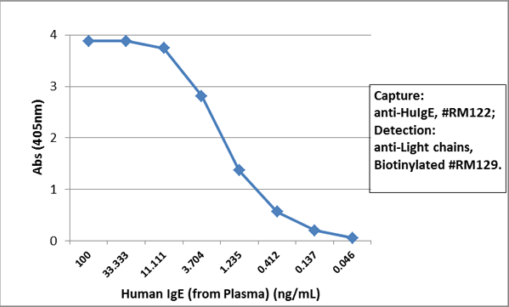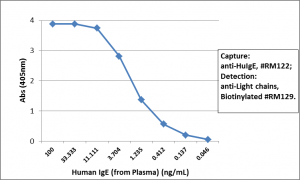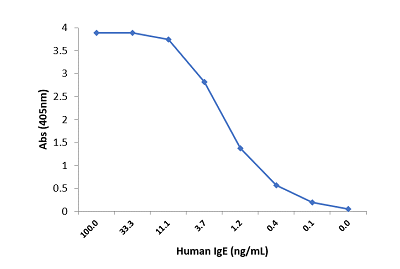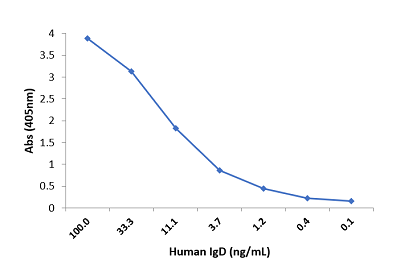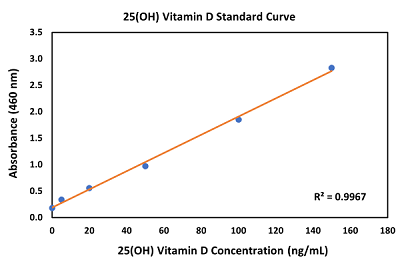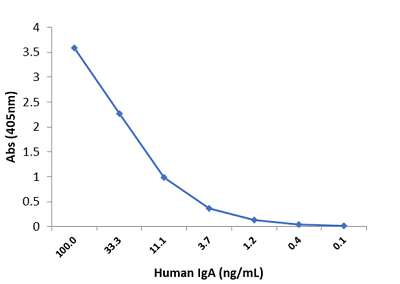
Sandwich ELISA using RM128 as the capture antibody (100ng/well), and Biotinylated anti-human light chains (k+l) antibody RM129 (0.2ug/mL) as the detection antibody, followed by an alkaline phosphatase conjugated streptavidin.
IgA (human) Matched Antibody Pair
REV-31-1030-MK
ApplicationsELISA
Product group Antibodies
ReactivityHuman
Overview
- SupplierRevMAb Biosciences
- Product NameIgA (human) Matched Antibody Pair
- Delivery Days Customer2
- ApplicationsELISA
- CertificationResearch Use Only
- Protein IDP01876
- Protein NameImmunoglobulin heavy constant alpha 1
- Scientific DescriptionThe Human IgA Matched Antibody Pairs is specific to Human IgA and has been demonstrated through ELISA. It does not cross-react to IgG from Non-Human Primate species (Rhesus and Cynomologus macaques), or mouse, rat or goat immunoglobulin. The kit can be used for the detection of therapeutic antibodies from samples obtained from experimental animals to provide accurate pharmacokinetic (PK) data. Immunoglobulin A (IgA) is an antibody isotype that plays a crucial role in the immune function of mucous membranes. IgA has two subclasses (IgA1 and IgA2) and can be produced as a monomeric as well as a dimeric form. The IgA dimeric form is the most prevalent and is also called secretory IgA (sIgA). sIgA is the main immunoglobulin found in mucous secretions, including tears, saliva, sweat, colostrum and secretions from the genitourinary tract, gastrointestinal tract, prostate and respiratory epithelium. It is also found in small amounts in blood. The secretory component of sIgA protects the immunoglobulin from being degraded by proteolytic enzymes; thus, sIgA can survive in the harsh gastrointestinal tract environment and provide protection against microbes that multiply in body secretions. In the blood, IgA interacts with the Fc receptor called FcalphaRI (or CD89), which is expressed on immune effector cells, to initiate inflammatory reactions. - The Human IgA Matched Antibody Pairs is specific to Human IgA and has been demonstrated through ELISA. It does not cross-react to IgG from Non-Human Primate species (Rhesus and Cynomologus macaques), or mouse, rat or goat immunoglobulin. The kit can be used for the detection of therapeutic antibodies from samples obtained from experimental animals to provide accurate pharmacokinetic (PK) data.Immunoglobulin A (IgA) is an antibody isotype that plays a crucial role in the immune function of mucous membranes. IgA has two subclasses (IgA1 and IgA2) and can be produced as a monomeric as well as a dimeric form. The IgA dimeric form is the most prevalent and is also called secretory IgA (sIgA). sIgA is the main immunoglobulin found in mucous secretions, including tears, saliva, sweat, colostrum and secretions from the genitourinary tract, gastrointestinal tract, prostate and respiratory epithelium. It is also found in small amounts in blood. The secretory component of sIgA protects the immunoglobulin from being degraded by proteolytic enzymes; thus, sIgA can survive in the harsh gastrointestinal tract environment and provide protection against microbes that multiply in body secretions. In the blood, IgA interacts with the Fc receptor called FcalphaRI (or CD89), which is expressed on immune effector cells, to initiate inflammatory reactions.
- ReactivityHuman
- Storage Instruction-20°C,2°C to 8°C
- UNSPSC41116163

